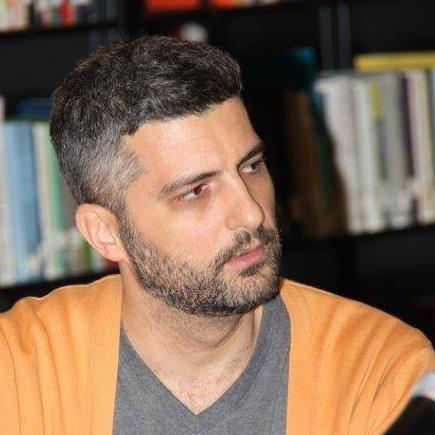Eldar Sarajlic

Associate Professor
Academic Literacy and Linguistics
EMAIL: esarajlic@bmcc.cuny.edu
Office: N-481
Office Hours: By appointment
Phone: +1 (212) 776-7359
Eldar Sarajlic is an applied philosopher. He has a Ph.D. from Central European University (CEU) in Budapest. His research interests are personal identity, public policy, and critical thinking and reasoning.
His work appeared in the Journal of Applied Philosophy, Critical Review of International Social and Political Philosophy, Canadian Journal of Philosophy, American Journal of Bioethics, Res Publica, and others.
Expertise
Social and Political Philosophy, Applied Ethics, Philosophy of Education, Epistemology, Philosophy of Data.
Degrees
Ph.D., Central European University, 2014
Courses Taught
- Critical Thinking (Same as CRT 100) is designed to develop the mind and help students learn to think clearly and effectively. Through substantive readings, structured writing assignments and ongoing discussions, students will examine concrete examples from their own experience and readings and contemporary issues in the media to learn how to analyze issues, solve problems, and make informed decisions in their academic, professional, and personal lives.
- This course develops students' abilities to reason well about scientific claims, scientific research, and the nature, value, and limits of scientific inquiry. To reason well about scientific claims, students understand and apply central scientific concepts, such as experiment, explanation, cause, effect, correlation, random sampling, testability, prediction, verification, and falsification. In addition, students evaluate instances of reasoning with such concepts by evaluating arguments for and against scientific claims and assessing the significance of possible outcomes of experiments. To reason well about the nature, value, and limits of scientific inquiry, students are introduced to central issues in the philosophy of science, such as the demarcation between science and pseudo-science, the reliability of scientific research, and the (un)reasonableness of beliefs about claims, such as moral and other normative claims, that fall outside the scope of sciences.
- Critical Thinking and Media Literacy is designed to help students become truth-seekers in the world of new media. Students develop a critical understanding of the nature of diverse media discourses – including aims to inform, entertain, and persuade – and evaluate their contents for veracity. This course exposes the students to two sets of basic concepts: First, epistemic concepts such as truth, falsity, knowledge, and belief; and second, media concepts, including both traditional (e.g., news, commentary, reporting) and contemporary ones (e.g., social networks, new media, fake news, click-bait). In addition, it provides them with analytical methods to interpret different kinds of media contents, as well as to write critical medial analysis.
Research and Projects
Publications
PEER REVIEW PUBLICATIONS:
(2020) Personal Identity and Its Properties, Philosophy and Public Issues, Vol. 10. No. 2. pp-193-233.
(2020) Children, Culture, and Body Modification, Kennedy Institute of Ethics Journal, Vol. 30. No. 2. pp-167-190.
(2020) Children, Self-knowledge, and Cultural Reproduction, Journal of Philosophy of Education, Vol. 54. No. 1. pp-43-61.
(2019) Homeschooling and Authenticity, Theory and Research in Education, Vol. 17. No. 3. pp-280-296.
(2019) Bullshit, Truth, and Reason, Philosophia, Vol. 47, No. 3, pp. 865-879.
(2018) Is Running a Marathon a Virtue? Think, Vol. 17, No. 48, pp. 101-105.
(2018) The Ethics and Politics of Child Naming, Journal of Applied Philosophy, Vol. 35, No. S1, pp. 121-139.
(2017) Neutrality, Autonomy, and Power, Critical Review of International Social and Political Philosophy, Vol. 20, No. 1, pp. 23-35.
(2015) Are Liberal Perfectionism and Neutrality Mutually Exclusive? Canadian Journal of Philosophy, Vol. 45, No. 4, pp. 515-537.
(2015) Do Predictive Brain Implants Threaten Patient Autonomy or Authenticity? American Journal of Bioethics (Neuroscience), Vol. 6, No. 4, pp. 30-32.
(2014) Can Culture Justify Infant Circumcision? Res Publica, Vol. 20, No. 4, pp. 327-343.
NON-PEER-REVIEW PUBLICATIONS
(2019) Becoming Parents to Ourselves , The New York Times (The Stone), access here: https://www.nytimes.com/2019/06/06/opinion/fathers-philosophy.html
(2019) Do you Have to be Rich to be a Philosopher? Areo Magazine, access here: https://areomagazine.com/2019/02/22/do-you-have-to-be-rich-to-be-a-philosopher/
(2017) Should Governments Outlaw Bad Child Names? Quillette, access here: http://quillette.com/2016/06/21/should-governments-outlaw-bad-child-names/
(2017) How to Prevent Another Trump in the Future? Teach Kids Philosophy Huffington Post, access here: https://www.huffingtonpost.com/eldar-sarajlic/how-to-prevent-another-trump_b_13019928.html
(2016) Donald Trump’s Reign of Bullshit, Salon, access here: https://www.salon.com/2016/03/27/donald_trumps_reign_of_bullsht_hes_not_lying_to_us_hes_just_completely_full_of_it/
(2015) How Muslim are the Muslim Terrorists? Open Democracy, access here: https://www.opendemocracy.net/eldar-sarajlic/how-muslim-are-muslim-terrorists
(2014) What (if Anything) is Wrong with Infant Circumcision? Oxford University Press Blog, access here: https://blog.oup.com/2014/01/what-is-wrong-with-infant-circumcision/
Honors, Awards and Affiliations
(2020) Stewart Travel Award, City University of New York
(2018) FFPP Fellowship, City University of New York
(2014) First prize for the best PG essay, Res Publica
(2013) CEU Travel Grant
(2010) CEU Ph.D. Scholarship
Additional Information
https://www.eldarsarajlic.com

